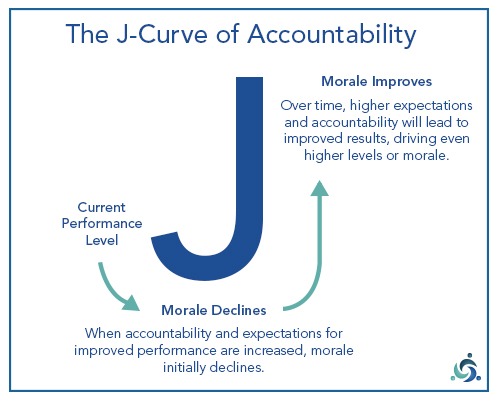Communication, Employee Engagement, Leadership
Are You a Leader, Manager, or Hostage?
We have come across a number of managers who fail to confront an employee’s unacceptable behaviors for a variety of reasons. Failing to hold team members accountable for their behavior results in a snowball effect that weakens your leadership, and ultimately leaves you a hostage.
In a recent seminar, several participants shared their reasons for not confronting an employee’s unacceptable behavior. Most of these reasons were tied to a fear of the repercussions of coaching these employees. Some of the reasons included:
- Fear of the employee’s reaction to being held accountable (tears, aggressive response, etc)
- Fear that the employee would try to spread ill will and discontent among the other employees on the team
- Fear that if that did try to hold the employee accountable, it would make the situation worse in a different regard. (Example: although the employee comes to work late, does not follow policies and procedures, and isn’t a team player, his/her measurable results (sales) are outstanding, and the leader fears these results could be impacted.)
- Fear that if they held the employee accountable, the employee would run to someone higher up in the organization who may side with the employee and not support you in holding the employee accountable
- Fear that if they held the employee accountable, the employee would threaten to quit, or actually quit.
In many of our books and articles, we state that the difference between a leader and a manager lies in one word…power. Managers get their power from a title on an organizational chart. This manager’s position gives him or her the power to tell a certain group of people what to do. A leader, on the other hand, may or may not have a formal title and/or position authority. To be a leader, you need to have a relationship with people where they are making the decision to follow you. Ask yourself this: if you left your current organization for a new organization, would your direct reports want to follow you to the new organization? If no one is following you, you are merely a manager taking a walk.
Back to the problem at hand. When you are afraid to take appropriate action to hold your employees accountable, you are neither a leader nor a manager…you are a HOSTAGE.
To be a leader, you need to be respected. When an employee holds you hostage for one of the above reasons, they don’t have respect for you. The bigger problem is that everyone else on your team sees that you’re not holding the deviant employee accountable, and these employees also end up losing their respect for you.
Here are 8 tips to reclaim your position as a manager and respected leader.
Lean in and get closer to the employee. Employees who hold their managers hostage effectively do so because they know their manager is hesitant or lacks the confidence to talk to them about the issue. In these cases, employees know what they’re supposed to do. When they choose to instead exhibit behaviors that undermine the success of the organization, team or manager, those behaviors need to be addressed in a timely manner.
Don’t manage by hoping and hinting. When an employee acts in an unsatisfactory manner, tell them exactly what you need them to do differently and when you need them to do it to be a successful member of the team.
Notify now, meet later. If you have informed the employee of the importance of arriving to work on time, but they do so again anyway, say something along the lines of, “John, we need to talk about your contributions to the team. I don’t have the time right at this moment, but I want to meet with you at 4:00 pm today.” This accomplishes three things. First, it immediately lets the employee know that their behavior is a problem for you. Second, it lets the employee think about the meeting during the day and that, most likely, is a good thing. Last, it allows you time as the manager to carefully thing about what you want to say or the questions you want to ask the employee in order to come to a mutual understanding of the problem.
Clear your strategy with your boss and HR. Employees who hold their boss hostage are able to do it for a reason. Usually, that reason is that they produce strong, measurable results. These employees tend to be the best sales people, or the most productive workers. Most times, their customers love them.
What you don’t want is for the employee to go around you, their manager, to your boss, and have your boss side with the employee. When the employee says, “I’m going to HR/your boss about this” and you have already reviewed your strategy with them, you can look the employee in the eye and say, “That’s a great idea, would you like me to help you set up a meeting?” When you have that level of confidence, you are well on your way to reclaiming your title of leader.
Follow up. During your meeting to discuss your employee’s accountability, set up a follow-up meeting to review their progress. Ensure that this meeting is put in both your and your employee’s calendars.
Expect the J Curve. When you begin to hold people accountable who resent the fact you are asking them to change their behaviors, you will often see the situation worsen before is gets better. We call this the J Curve, and I explained this in detail in our new leadership book.

Here’s a quick example. Prior to meeting with the employee, they communicated with you very little about the progress of their projects (the end of the small curve on the letter J). After you meet with them about turning their projects in complete and on time, they stop communicating with me altogether. (relationship gets worse – moves into the lower part of the J curve). As we work through the problems and they turn in their projects on time, they feel better about their performance and the relationship rises higher up the stem of the letter J, much higher than it ever was initially. Understanding this progression allows you to ride out the process without too many nasty surprises.
Remember the truth. Employees who threaten to quit over being held accountable rarely follow through on their threat. The reason they don’t quit is that they know a new employer isn’t going to put up with their crap, and the changes they will have to go through are much greater than simply correcting the problem you are discussing with them.
Have the guts to take big action! If the employee isn’t going to change, it’s time to regain your leadership title the old fashion way. Coach them. Counsel them. Train them. Document your process with HR’s help. When all that still doesn’t work, it’s time to share them with your best competitor and hire an employee who aligns with the culture of your team.
Employees do not respect weak managers who allows themselves to be taken hostage. Certain employees might like you for it, but they certainly don’t respect you for it. So, if you’re currently in a hostage situation and you want to be respected as a leader, it’s time to take action and do right by your team and organization.











Leave a reply